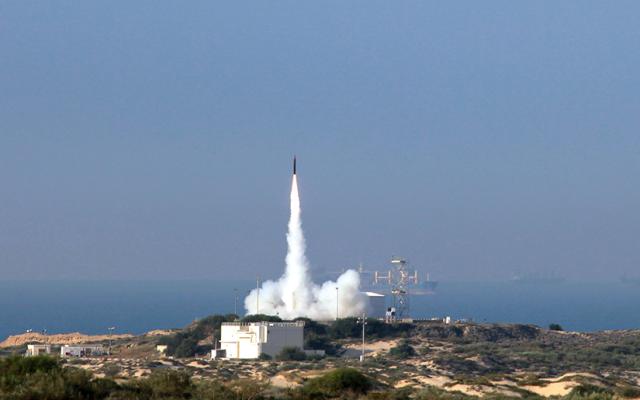The "Arrow 3" system achieved a momentous milestone on Thursday evening when it successfully intercepted a long-range ballistic missile soaring over the Eilat mountains. This event marked the first operational deployment of the system since the onset of the ongoing conflict. The aerospace industry, recognizing the significance of this achievement, extended their congratulations for the successful interception.
Boaz Levy, the CEO of Israel Aerospace Industries (IAI), expressed the historic nature of this interception and its strategic importance, stating, "This is a historic interception, which strategically emphasizes the multi-layered response of the State of Israel against long-term ballistic threats." Levy went on to emphasize the pivotal role played by the Arrow system within the Air Force's multi-layered defense framework, saying, "The Arrow system is the central defense component of the multi-layered defense system operated by the Air Force against ballistic missiles, and it proves once again that the State of Israel has the technologies that allow a bullet to hit a bullet, high in space, and especially the people behind the systems - these who dreamed up, initiated, planned and built the systems and those who operate them by the Israeli aviation industry led by the Ministry of Defense and the Missile Defense Agency in the United States."
Israel-Gaza war showcases key global security issues:
— Yonatan Touval (@Yonatan_Touval) November 9, 2023
US/NATO forces deployed in region demonstrate to #Ukraine a model for its future defense absent #NATO membership
The #Arrow-3 System's first operational interception today showcases #Europe's future defense against #Russia. pic.twitter.com/FN6I1dSeqm
This remarkable accomplishment showcased the Arrow 3 interceptor, which has been in operational service since 2017. It followed the recent operational use of the Arrow 2 interceptor. The Arrow 3 system, a collaborative effort between an IDF directorate, the American Missile Defense Agency (MDA), and Israel Aerospace Industries, represents the pinnacle of air defense technology for intercepting ballistic missiles outside Earth's atmosphere.
Arrow 3 is an exo-atmospheric interceptor with the capability of intercepting long-range threats at high altitudes above the atmosphere. Brigadier General Daniel Hagari, the IDF spokesperson, provided insights into the situation, stating that a missile threat aimed at Israel was intercepted at a considerable distance from Eilat, where the incident occurred. The prompt activation of warnings and alarms allowed for the successful neutralization of the surface-to-surface missile. General Hagari commended the effectiveness of the defense systems in the Eilat region and expressed the IDF's commitment to conducting a thorough investigation and learning from this event.
The Arrow 3 System's first successful operational interception: Israeli Air Defense Array soldiers successfully launched an Arrow 3 interceptor this evening, effectively intercepting a target launched towards Israel in the Red Sea region.
— Ministry of Defense (@Israel_MOD) November 9, 2023
Pictured: Arrow system archive photo pic.twitter.com/RkS3GJic09
This missile interception follows an earlier incident in which a drone exploded within the city of Eilat, initially suspected to have originated from Yemen. Subsequent investigations revealed that the drone was actually of Syrian origin. It is worth noting that the method of drone deployment used in this incident was developed by Iranian actors and has been adopted by Shiite militias in Syria. This innovation enabled them to identify a target within the southern Israeli city of Eilat without triggering any alarms.


